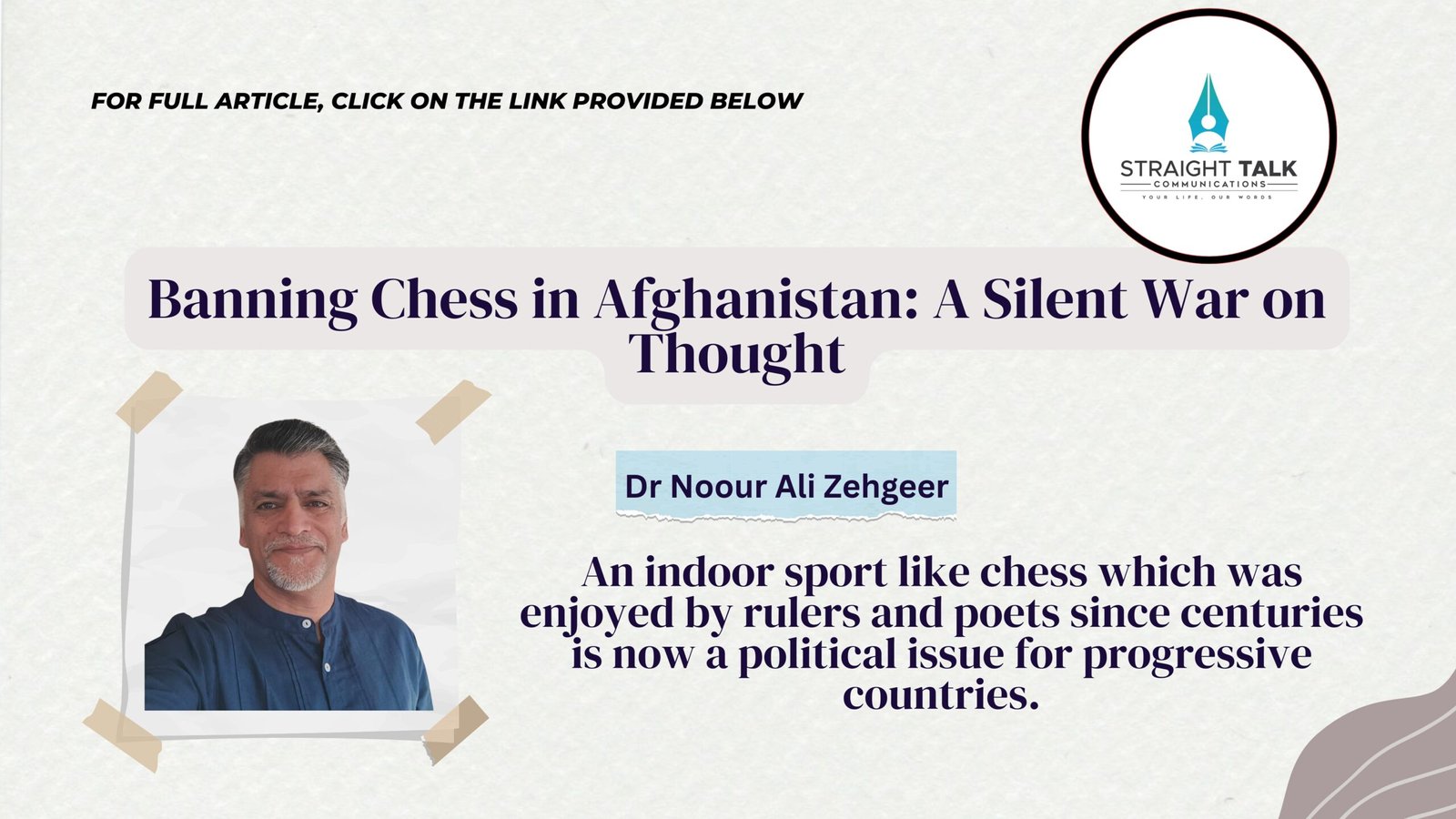Banning Chess in Afghanistan: A Silent War on Thought

Dr Noour Ali Zehgeer
An indoor sport like chess which was enjoyed by rulers and poets since centuries is now a political issue for progressive countries. Old days friendship was defined by have a game of chess with Hooka. Who would have predicted then that Islamic nation will ban this game for unknown reasons. In an astonishing move that has baffled me and observers worldwide, the Taliban regime in Afghanistan has officially suspended all chess-related activities, citing concerns over the game’s compatibility with Islamic values. According to the Directorate of Physical Education and Sports, the suspension will remain in place until a religious assessment concludes whether the game is permissible under Islamic law.
For a nation facing crushing poverty, gender apartheid, and economic collapse, banning a centuries-old board game seems both absurd and revealing. It marks another chapter in the Taliban’s systematic dismantling of intellectual and cultural life in Afghanistan — a quiet but devastating war on thought.
A Game of Kings Declared Haram
Chess, a game known for encouraging logic, strategy, and discipline, has long been considered a noble pursuit in many Muslim societies. Originating in ancient India as chaturanga, it was adopted and cherished across the Islamic world, especially during the Islamic Golden Age. Prominent Muslim scholars wrote treatises on chess, and rulers such as the Abbasid Caliph Harun al-Rashid were avid players.
However, the Taliban’s rationale is rooted in the possibility that chess could involve gambling, which is forbidden (haram) in Islam. While it’s true that any activity involving betting could be deemed problematic in religious terms, equating chess with gambling is widely viewed as an extreme and uninformed position.
Chess, by design, does not require or promote betting. It demands concentration, foresight, and mental endurance — qualities that have historically been admired, not condemned. Yet, in the Taliban’s rigid worldview, even the perception of moral ambiguity is enough to warrant suppression.
Morality Policing in a Nation Starved of Stability
The timing of the suspension is particularly troubling. Afghanistan remains one of the most impoverished countries in the world, with over 90% of its population living below the poverty line. Hunger is widespread, women have been barred from education and employment, and international aid has diminished. In this bleak landscape, banning a quiet game of intellect seems not just disproportionate — it seems deliberate.
The move aligns with the Taliban’s broader efforts to erase any activity that fosters independent thinking or intellectual curiosity. Since their return to power in August 2021, they have dismantled the education system for girls beyond the sixth grade, restricted the operations of NGOs, censored the media, and suppressed dissent.
By outlawing chess — a game that sharpens the mind — the Taliban reinforce a pattern: they fear the liberating power of thought more than the threats of famine, illiteracy, or unemployment.
Guns Are Legal, But Bishops and Pawns Are Not?
What makes this ban even more ironic is the contrast between what the regime allows and what it targets. Weapons are still freely carried in many parts of Afghanistan. Armed groups, religious police patrols, and enforcers of Taliban edicts operate with impunity. And yet, it is chess — a harmless, peaceful pastime — that has been singled out as a threat.
The Taliban’s selective morality is as strategic as it is performative. Outlawing a symbol of intellectualism sends a clear message: in their version of an Islamic state, thought is suspect, knowledge is subversive, and any form of recreation that encourages mental discipline is unwelcome.
International and Cultural Backlash
The global chess community has reacted with dismay and ridicule. Social media has been flooded with sarcastic memes, incredulous commentary, and symbolic condemnations. Posts compare the ban to a medieval fear of knowledge, with one user quipping, “Next they’ll outlaw math for resembling sorcery.” Another joked, “Will Sudoku be the next victim?”
Iranian grandmaster Ehsan Ghaem-Maghami called the ban a “tragedy for the intellect,” stressing that chess fosters patience, humility, and strategic thought — values that are hardly subversive in any rational moral code.
While major organizations like the International Chess Federation (FIDE) have yet to respond officially, many regional bodies in the Middle East have expressed solidarity with Afghan players.
More Than Just a Game
The ban on chess in Afghanistan is symbolic of a much deeper and dangerous issue: the shrinking space for intellectual life under authoritarian rule. For decades, Afghan players participated in local and regional tournaments. Names like Mohammad Hasib Farhadi once stood as symbols of Afghanistan’s quiet intellectual potential on the global stage.
Now, such aspirations have been halted — not by lack of talent or resources, but by ideological dogma. The Taliban’s war is not just against women, modernity, or the West. It is a war against enlightenment itself.
By attacking a game that trains the mind, the Taliban are targeting the very tools that enable people to question, plan, and resist. That is the true threat they perceive — not the game of chess, but the kind of thinking it nurtures.
Final Move: A Nation Under Siege
Afghanistan today is a country where a queen on a chessboard is seen as dangerous, while real-world suffering continues unchecked. The ban on chess may seem laughable to outsiders, but to those living under Taliban rule, it is another sign that joy, intellect, and free will are luxuries the regime cannot tolerate.
In a world where even the most basic liberties are under siege, the banning of chess is a sobering reminder that authoritarianism doesn’t just silence people — it silences possibility.
And yet, chess — a game older than most nations — has survived wars, crusades, and censorship before. It will survive the Taliban too. The question is whether the spirit of the Afghan people, so often tested, will be allowed to make its next move.
Until then, the board remains empty. But not defeated.







